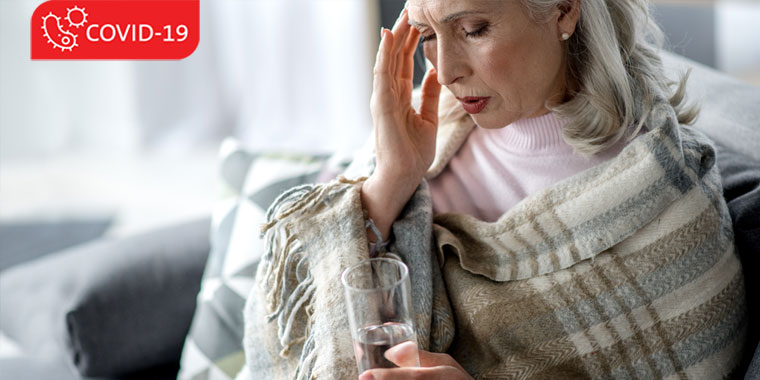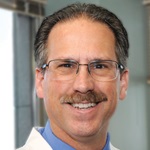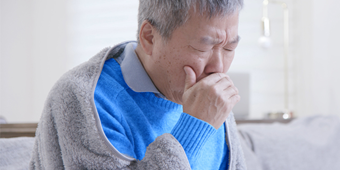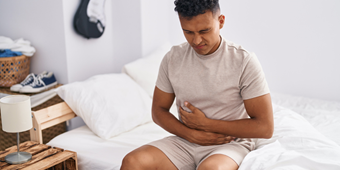COVID-19 Recovery At Home: How to Care for Yourself

Find Your Perfect Match
Answer a few questions and we'll provide you with a list of primary care providers that best fit your needs.
If you’ve been diagnosed with COVID-19, you’re not alone. As more of us experience this virus, we gain insight into the best ways to manage self-care at home.
For guidance, we talked to Randy Marriott, MD, board-certified emergency physician and medical director of the Premier Health EMS Center of Excellence.
If your symptoms are moderate and you can recover safely at home, Dr. Marriott says following the typical guidance for flu-like symptoms is best.
“Get rest, stay hydrated, and control your fever,” Dr. Marriott says. “Those are the most important steps.”
Monitor Your Fever And Oxygen Levels
COVID-19 symptoms can quickly change or worsen. A high fever or low oxygen levels can be dangerous, Dr. Marriott says.
You can control your fever by taking over-the-counter medicines like ibuprofen or acetaminophen. Controlling your fever:
- Makes you more comfortable
- Puts less stress on your cardiovascular system
- Reduces fluid loss
“People lose moisture through heat leaving their body,” Dr. Marriott says. “When you have a higher temperature, you breathe faster and exhale more moisture.”
Moisture also evaporates from your skin, especially if you’re sweating. If you cannot control your fever, call your doctor or go to the emergency department.
You can track your oxygen saturation levels with a pulse oximeter. This small device clips onto your finger. A light beam measures how much oxygen is in your blood cells. An oxygen level of 90 or below is a sign of trouble, Dr. Marriott says.
“That's where we will intervene with oxygen for sure,” Dr. Marriott says. “We would not release you from the hospital with a pulse oximetry reading below 90, unless you have home oxygen.”
By using a home pulse oximeter, you can keep an eye on your numbers. If they trend downward, contact your doctor or go to the emergency department. Talk to your doctor about the right type of pulse oximeter to use, to ensure accurate readings.
COVID Care Kits
Now that there is less of a stigma attached to catching COVID-19, more people are sharing their tips and tricks to feel better. COVID-19 care kits are also en vogue.
Receiving packages from family and friends can definitely boost your mood. However, Dr. Marriott says many of the supplements and remedies recommended by others do not have a scientific track record of making an impact on COVID-19 recovery. Those supplements include melatonin, vitamins B and D, and zinc.
“As far as maintaining your sleep cycle while you're ill, that's probably helpful,” Dr. Marriott says. “Is it going to improve your recovery or speed your recovery? No. Is it going to provide some comfort while you're ill? Potentially.”
Dr. Marriott says as long as you don’t take more than the recommended dose, melatonin and vitamins are not harmful. “Whether it's going to give you much benefit or not, that's another story.”
What’s important, Dr. Marriott says, is to stay hydrated and maintain a good sleep/wake cycle. Melatonin might help, but getting rest is key to helping your body fight off the virus.
Follow These Tips for a Better COVID-19 Recovery
Whether you live alone or with others, you can take steps to keep others safe, reduce your COVID-19 symptoms, and feel better — all while keeping others safe. Be sure you understand the difference between isolation and quarantine.
As you care for yourself at home, the Centers for Disease Control and Prevention and Dr. Marriott recommend:
- Clean all high touch surfaces (doorknobs, counters, etc.) daily
- Cover your coughs and sneezes
- Do not share personal items like bedding, dishes, or towels
- Get rest
- Monitor your symptoms
- Stay away from family members
- Stay home
- Stay hydrated
- Stay in one room
- Use a separate bathroom if you can
- Wash your hands often
Find Your Perfect Match
Answer a few questions and we'll provide you with a list of primary care providers that best fit your needs.
Sources: Randy Marriott, MD; Centers for Disease Control and Prevention





